#allegory conveys a MESSAGE
Explore tagged Tumblr posts
Text
Day 1,854 of people in the Tolkien fandom not knowing what an allegory is
#not a metaphor#not an allusion#not a theme#and especially not an author subconsciously processing things from their life#allegory is purposeful#allegory conveys a MESSAGE#tribble post#this one’s salty#but honestly#I liked that Lindsey Ellis video too but I actually know what she was getting at#the POINT tolkien was making is that you shouldn’t transplant a moral or a agenda from the real world to a fantasy one#because the history and build up isn’t the same#and I don’t strictly agree with that but I GET it#don’t mind me
16 notes
·
View notes
Text
Blue Moon

Summary: A series of occasions when the JJK sorcerers required your comforting embrace ...
(x Reader)
Featuring: Gojo, Kusakabe, Nanami and Ijichi.
Genre: Fluff, romance, humour.
CW: Suggestive language.

Gojo
"On a scale of 10 to 11, how blue do my eyes look this morning?"
"Satoru, what do you want?"
One arm raised, elbow crooked in nonchalant allure against the doorframe, Satoru blinks in feigned innocence. He shifts such that the torso-hugging shirt he has on slides against each defined line of his pectorals.
"I just wanna know. It's nice to hear how handsome I am, from time to time."
"Seriously?"
He cradles his chin between thumb and forefinger.
"I mean, my jawline alone can cut diamonds - "
"Come here."
He grins, having conveyed his message clearly, if a tad ham-handedly. Elbow dropping from the doorframe, he steps into the bedroom, his tall frame stooping until his nose is level with yours.
If you intended to initiate anything at all, you can shelve that idea. Satoru's arms are already sliding around your waist, drawing you impossibly close. His face drops to your shoulder, blowing a playful puff of air against you before he presses into the crook of your neck.
He feels solid in your arms, present. A cloud of pale hair, silky and fragrant, drifts across your vision. The scent of him is warm, vital, alive. You trace gently across the contours of his back before your embrace finally encloses him, feeling his exhale blow heatedly against your skin.
These are the rare occasions when he seeks you out for reassurance under the guise of mischievous ribbing, when he grounds himself in the staid, reliable nature of your presence, when he needs you.
Slowly parting from him, you glance up at the slightly muted brilliance of his glance, the softness that hovers at the edges of that almost ethereal countenance.
"Ready for work?"
"I am now."
You pat him solidly in the middle of his chest, resting your palm there for a minute before pushing him towards the door. The residual humidity of his breath lingers on your throat.
"Now hurry up and go, before I get sliced with that lethal jawline."

Kusakabe
"And then I said, why the heck can't we just take the safe route, not track through the fucking woods in pitch darkness, with a hurricane lamp that could attract every goddamn curse in the region - "
Atsuya cuts off, the scrape of the blade through the lather on his chin punctuating each point he deemed significant.
" - but of course, they didn't wanna hear it. "That's what sorcerers do, they take the dark path." Ha. They can take that poetic allegory shit and shove it."
You complete the task of drying yourself, fingers tracing lightly over the muscled wall of his back as you pass him, reaching for the hairdryer plugged into the wall just outside.
"Were there any injuries?"
"Miwa got a few scratches, but nothing serious."
He rinses off the blade, white foam circling around the drain of the sink before raising his arm again, skin appearing through the curtain of white on the sharp edges of his cheek.
"I told those kids before, you can't rely on anyone else. In a sticky situation, you gotta analyse the environment, know your opponent, observe their abilities, think and act at the same time - "
The noise of the hairdryer temporarily drowns out his voice, and he turns slightly as he sees your smile. You reach for him with your free arm, hair blowing across your face, and he grunts in amusement.
"I've still got shaving cream all over - "
"And when has that ever stopped you?"
No further convincing is needed because Atsuya's bare chest is now against your back, his arms coming up and around your middle, strong fingers linking securely over your abdomen. The coarse scattering of hair across his torso tickles between your shoulder blades. The heat of him is intoxicating, as always.
You squirm slightly in his grasp as the cool shaving cream smears across your shoulder, where he rests his chin, the dim light of the bathroom temporarily shading the green of his eyes to a subtle olive. Prickles of stubble, tender as the new growth of shoots in spring, sink into your still-damp skin.
You turn off the hairdryer, for now. You can't help yourself when your Atsuya is this close, the clean, warm scent of him wrapping around you, infinitely soft. You press your lips in a trail across his cheek, watching as his eyes close, as the rigidity of his powerful shoulders ease under your ministrations.
Drawing away, you see his eyes flick sideways at you, and you can feel the laugh that reverberates like low thunder through his chest. Your face is smeared with white.
"If you wanted to shave too, you should have just said so."
"What if I said I borrowed one of your shaving blades for my legs?"
"No wonder they're so silky smooth."
"Not as smooth as that tongue of yours."
"And you're the first person who's ever thought so."

Nanami
Kento had been pristine, as always, when he'd left home. You'd seen his clothes prepared the previous day, the suit and shirt hung neatly against the closet, socks laid aside, shoes polished to high shine.
You'd watched him comb back his hair that morning, your fingers gently caressing his undercut as you'd made your way to the kitchen to deal with breakfast. You'd watched the small smile curve the corner of his mouth as he'd fastened his watch in place.
Orderly and somewhat fastidious, was your Kento, punctual to a fault, even in the way he kissed you at exactly 8 am at the door, the Jujutsu Tech vehicle waiting outside to swallow him into its cool, dim interior.
His lips had lingered softly on yours, as always, stealing moments from the impatient clock on the wall behind you. You'd straightened his tie, one palm smoothing the slightly hollowed cheek (which had filled out a little recently with your cooking) and then you'd stepped back and treasured the softening of his eyes before the glasses were placed firmly on the bridge of his nose.
So, it was with a sense of growing concern that you watched the same clock that had governed your separation that morning. He was three hours late, and counting. He'd managed to send a brief message earlier that day, that things were gearing up to be a little troublesome. Still, you worried.
You always had.
At 10 pm, the sound of the key slotting into the latch heralds his return. Kento pushes the door open, a heavy sigh reaching your ears as you approach.
He is no longer pristine.
His hair hangs down to his eyes, greasy and disshevelled, the tie nowhere to be seen. His shirt is stained and crusted with darker patches under the arms and across his chest and back. His pants are ripped and you see the bandages beneath where he must have received treatment already. His tired eyes meet yours, and you hold out your arms to him. A soft laugh sounds against the noise of the pot bubbling on the stove.
"I'm filthy. And covered in - "
"Do you see me complaining? No more questions, love."
He grumbles good naturedly, but you know that he not-so-secretly loves it when you take charge at home.
In one stride, he is within the welcoming bracket of your arms, head drooping tiredly against the softness of your chest. He is tall enough that the position is slightly awkward, but he has anchored himself to you for support, and you brace your knees as you take his weight.
He smells of sweat, dirt and something damp and unpleasant that reminds you distinctly of a sewer. You smile and bury your nose into his hair, the unique, masculine scent of him, of Kento, now cutting through the other distractions.
You hold him like this, cradling his head close, whispering soft endearments meant only for his ears, until the stretch in his spine wears him out. He rouses from your embrace, eyes puffy and a trifle unfocused. Long lashes brush slowly together and he yawns.
"Had a good rest there?"
His voice rumbles delightfully through your frame where you are still pressed together, mellow and slightly slurred within the familiarity of these walls.
"A most peaceful one."
You tap the area where his head had been a few moments ago.
"Would you like to rent this space out, sir? It's available, every evening after five."
There it is, that quiet, mischievous smile, the one that spreads tender crow's feet at the corners of his eyes.
"Only after I've inspected it thoroughly, ma'am."

Ijichi
You pause in the doorway. Kiyotaka is pacing the courtyard outside, phone balanced between shoulder and ear. He flips aggravatedly through the folder in his hands.
"Yes, yes, I understand - No - I will - Listen, please. Yes, company cars are expensive, I know better than anyone. However, forcing a trainee to shoulder the full burden of compensation just because he - "
He notices you, out of the corner of his eye. You wave to him and gesture to the files in your hand. He gives a harried nod before a frown marrs his brow.
"No, no, I don't think the fact that he saw a spirit and screamed like a little girl, as you put it, affects his level of accountability in any way. Our policy states that - "
In two quick paces, you reach him, snatching the phone out of his hand. Barking sharply at the person on the other end, you complete his statement.
"Our policy clearly indicates that trainees are exempt from damages incurred during any coursework. And that includes driving. Goodbye."
Ending the call, you huff out an annoyed breath before handing the phone gently back to him. He sighs and you see his glance hover sideways, alighting on the files you're holding. You dismiss his concerns with a wave of your hand.
"Oh, these can wait. Don't worry. How about we go in and have some coffee?"
"Actually ..."
"Yes?"
"I'dratherhaveahug."
"Pardon?"
"I'd ... rather have a hug."
"Oh!"
Your eyes widen slightly as you drop the files haphazardly on a nearby bench. Ijichi eyes them worriedly.
"Wait, what if the wind - "
"Then we'll say Fushiguro's dogs ate them."
"Eh?"
You laugh at his bewildered expression before tugging lightly on his tie, drawing him close. A flush steals over his cheeks, as you lean in and brush your nose against his, fingers slipping from the tie to the surprisingly strong line of his shoulders.
"Here's the hug you ordered."
"W - Well, yes, but let's be - "
He cuts off as you wrap your arms tightly around his neck, one hand sliding stealthily under his coat to caress his back. You feel his Adam's apple bob as he returns the gesture, relaxing slightly into the embrace as his breathing evens out, stirring your hair slightly.
You both stay this way for some time, as the wind whistles in the corners between the statues all around you, mercifully leaving the files intact. You lean back and are about to release him when his hand clasps firmly on the small of your back, and he dips you, smiling as your delighted laugh echoes within the enclosed yard.
As he draws you back up into a brief kiss, you marvel at his sudden bravery. But then again, this is what you love most about Kiyotaka. As shy, anxious, stressed and fatigued as he is (mostly), there was a side to him that always warmed you pleasantly when your thoughts drifted to him.
He was the man who brought you regional treats from wherever his job happened to take him, who made sure that you were safe at all hours of the day, who would pursue you with an umbrella when you'd forgotten yours, who ensured that you'd eaten on time, even when he was swamped with work.
As you separate, you see that in spite of his daring, debeonair action, his ears have turned a startling shade of scarlet. You pinch one of them lightly and smirk.
"Looks like you've been eating spicy food again."
He clears his throat.
"The only spicy thing I've consumed is ... you."
Slapping a hand against your chest in feigned shock, you gasp theatrically.
"Why, Kiyotaka! How positively scandalous!"
A rare grin crosses his tired features.
"If you really want to see scandalous, you should have a look at Yaga's internet search history."

#jjk#jujutsu kaisen#jjk fanfic#jujutsu kaisen fanfic#jjk x reader#jjk x you#gojo satoru#jjk gojo#gojo x reader#gojo x you#kusakabe atsuya#jjk kusakabe#kusakabe x reader#kusakabe x you#nanami kento#jjk nanami#nanami x reader#nanami x you#ijichi kiyotaka#jjk ijichi#ijichi x reader#ijichi x you#jjk fluff#jjk romance#jjk humor#sorcerers need hugs too#it is their right!#squeeze them very tightly#eveyone gets hugs
200 notes
·
View notes
Text
Watched the Nimona movie last night. Review I guess. It was pretty damn good. Definitely would’ve probably been regarded as Blue Sky’s magnum opus if they’d gotten to release it instead of being fucked over by Disney. Very cute, very funny, very powerful in the right moments. A thing that stuck out to me is that it’s really only an adaptation in the loosest sense of the word. It takes the core premise and beats of the comic but is functionally an entirely different kind of story that does its own thing. And given that ND Stevenson was heavily involved in production, I suspect that was intentional.
The comic was much darker and more downbeat in a lot of ways, plus it was significantly longer and thus could afford to be slower paced. But more than that, it was a lot more meaty in terms of themes and scope. The whole “LGBT allegory” element was there, but it wasn’t the sole focus, the comic was a story about a lot of different things; not just an LGBT experience, but also discussion of fantasy genre tropes and clichés, criticism of other fantasy deconstructions, character study, exploring what it means to be a hero or villain, critique of the glorification of crime and cruelty in underprivileged communities, corruption in governments, peer pressure, the senseless and self-perpetuating nature of violence, the worthlessness of revenge, etc.. And above all that, it was a story about trauma and people’s responses to it, with Ballister representing people who actually deal with their problems and move on while Nimona represented people who let their mistakes and suffering and grief consume their identity, or worse, use it as an excuse to indulge their worst qualities and take out their feelings on everyone around them.
The movie, by contrast, has a much more narrow focus. The LGBT allegory is front and center and basically the entire focal point of the movie, aside from a spattering of themes about the danger of zealotry and rigid fundamentalist thinking. This gives the movie a much tighter narrative and pacing that suits its inherently shorter runtime, but also leads to a ton of changes to the story either to convey a different kind of message or just work better in a different medium. Most obviously in how Nimona is vastly more sympathetic in the movie and essentially really is the silly gremlin the comic fakes you out into thinking she is, scrapping the comic’s twist that she was a genuinely bad person who was completely serious about wanting to be a villain, caring nothing for the lives she destroyed with her behavior and idolizing Ballister because she thought he was the same as her and would thus tell her what she wanted to hear (i.e., that she was justified in killing and destroying everything around her in the name of getting even). And in the changes to the Institution’s history and nature. And all sorts of other things.
All in all, I feel if you go in comparing and contrasting the movie and the comic, arguing which changes are for the better or worse, you’ll be setting yourself up for disappointment in either direction because they’re two different beasts and it’s like comparing apples and oranges. So keep that in mind if you’re a fan of the comic watching the movie or a fan of the movie wanting to look into the comic. I think ultimately I still like the comic better, but that’s purely my personal opinion and there’s plenty that I think the movie did better.
Some other observations:
Riz Ahmed my beloved, thank you Mr. Stevenson for this perfect casting. Literally perfect for Ballister.
Acting in general was very good. You can tell this was a passion project for a lot of people, not just Stevenson.
Only two changes that are objectively bad are Ambrosius losing his awesome Van Halen hairdo and changing Ballister’s last name — Blackheart is a way cooler name than Boldheart and it’s a pointless change, one that I’d argue even hurts the narrative since it makes it too obvious that Ballister isn’t actually a bad guy.
The animation is really great with fantastic expressions, stylish movement, and wonderful aesthetics that perfectly suit the story, but there’s times where it feels a little off. But there are parts where it looks less “movie” and more “cheap mid-2000s CGI-and-Flash cartoon show from France”.
The humor can be a hit and miss, in a “going through the motions of a Hollywood animated comedy for kids” way. The movie excels when it’s either imitating the comic’s Old Internet sense of humor or going hard on the drama, but there’s bits where it seemingly slams on the brakes to do Illumination-esque Twitter humor and those bits definitely throw off the vibe.
Having an actual straight up attempted suicide in the climax was shockingly ballsy. I genuinely can’t believe they went there, but I’m glad they did because the film wouldn’t have felt nearly as raw without it.
I don’t know how they managed to make the Director even more of an asshole than in the comics, but they did.
#nimona#nimona film#nd stevenson#ballister boldheart#ballister blackheart#ambrosius goldenloin#movie review#animated movies#movies#films#comic books#dc comics#webcomic#web comics#indie comics#netflix#blue sky studios#lgbt film#lgbt fantasy
720 notes
·
View notes
Note
It always mega bothers me too, when people theorize that Clancy or the Torchbearer will die. Blurryface/Nico is an avatar of Tyler's inner demons, so it would completely go against the message of TOP's songs, if he won in the end!
tw// depression & suicide
Yes exactly, I think people sometimes get lost in the epic spectacle of it all and forget that this story is at its core an allegory of battling your mental illness. Tyler and Josh have always been staunch advocates of promoting life over death and have clearly expressed their hatred toward the glorification of suicide. If this was any other story, one of them dying could just be a possible but tragic cliché but we're talking about fighting depression, anxiety, suicidal tendencies etc here. Deaths have already appeared TOO MUCH onscreen, look at all those desecrated bodies of the glorious gones. Ending it with one of the boys' characters' death on top of that would dangerously defeat the whole purpose of the hopeful message they're trying to convey - it's simply too bleak!!
Like I said in another post, I'm fine with the idea of Clancy's (or Torch's) sacrifice AS LONG AS he "comes back to life" and not just. die for shock value. But personally I think a more probable direction this story will take is Tyler/Clancy finally saving himself at the end unlike the other times Josh/Torchbearer saved him because this story is about "a balance between being saved by a friend, and saving yourself" as quoted from the band.
I highly doubt they're going to give the story a clear-cut closure happily ever after style, but they certainly won't kill off one of the protagonists for tragedy's sake either. “It’s not a problem to solve, it’s a tension to manage.” And they'll manage the tension well for the clique to find glimmers of hope in it. Not mourn for another neon gravestone.
so STOP SAYING THEY'RE GONNA DIE PEOPLE
62 notes
·
View notes
Note
I'm making a fantasy novel and I was curious if you can use the main cast's character arcs to get across a story's message or theme?
Thanks for asking! Using the main cast's character arcs to convey a story's message or theme in a fantasy novel is a powerful way to engage readers and drive home the central ideas of the narrative. Here are some tips:
Establish the Theme: First, identify the theme or message you want to convey in your fantasy novel. This could be something like the power of friendship, the importance of self-discovery, the consequences of greed, the triumph of good over evil, etc.
Develop Diverse Characters: Create a main cast of characters with diverse backgrounds, personalities, and motivations. Make each character representative of a different aspect or perspective related to the theme.
Introduce Character Arcs: Give each character a unique arc that explores their growth, struggles, and eventual transformation throughout the story. These arcs should be directly tied to the theme and contribute to its exploration. (See my post on character arcs for more tips!)
Interconnect the Arcs: While each character has their individual arc, ensure that their journeys intersect and influence one another. This allows for a richer exploration of the theme as characters learn from each other and grow together.
Symbolism and Allegory: Include different elements, symbolism, and allegory throughout the story to deepen the thematic exploration, such as making inner struggles or external conflicts metaphors for larger societal issues.
Resolution and Reflection: As the story progresses, bring the character arcs to a resolution that reflects the overarching theme. Characters should undergo meaningful change or realisation that reinforces the message of the narrative.
Showcase Contrast and Conflict: Highlight contrasting viewpoints or conflicting beliefs among the main cast to add depth to the thematic exploration. This allows for a more nuanced examination of the theme and keeps the narrative dynamic.
Use Dialogue and Interaction: Dialogue and interactions between characters are crucial for revealing their growth and highlighting the theme. Encourage meaningful exchanges that challenge beliefs, offer insights, or facilitate personal growth for your characters.
Hope this helped! Happy writing ❤
Previous | Next
#ask#writeblr#writing#writing tips#writing advice#writing help#writing resources#creative writing#plot development#deception-united
67 notes
·
View notes
Text

An allegory is in this case is a painting meant to convey some type of hidden message usually one thats moral, spiritual, political, etc. In “Alegoría del invierno” Varo showcases a butterfly, birds, and flowers encased in ice with an obvious connotation of protection from the absurdly long spines from the cacti but as far as the allegorical meaning its hard to say,,,
Varo, Remedios. Alegoría del invierno (Allegory of winter). 1948. gouache on paper, 44 x 44 cm. Museo Nacional Centro de Arte Reina Sofía, ADAGP, Paris.
15 notes
·
View notes
Text
The Darkling’s ending in Shadow and Bone season 2 was so excessively cruel that it flattened every bit of complexity Ben Barnes had imbued him with along with the nuance that could have been carried over from the books.
I saw a post on twitter that read something along the lines of “People hate humanizing depictions of abusers because it forces them to exist in a complicated emotional reality that their victims were trapped in for years.” I believe that this passage is emblematic of the approach the writers took to rewriting and adapting the end of Ruin and Rising into the Netflix show.
Now I’ve written at length about how I believe that the “Darkling as an allegory for abusive men” is extremely flawed and ultimately fails to convey the message it wanted to deliver. But interpreting the show through the lens that, in the writers minds, Aleksander is a good and subversive depiction of an abusive man me helps me understand why they rewrote the ending.
In the books, Aleksander’s death is not only written explicitly as a sad (not triumphant) moment, but also an extremely intimate one. At that point, he had essentially given up and surrendered to Alina following the devastating realization that without Alina and Baghra an eternity of suffering and loneliness awaits him. He could never return to the community he had built and protected for decades and this moment is recognized in the text as a tragic culmination of his life of struggles. Of course, this moment is not without its flaws given that it supports the narrative that power = corruption and evil, but it is humanizing regardless. He dies in Alina’s arms in a moment of vulnerability where Alina promises to fulfill his final wish and is allowed to feel saddened by his death.
So of course the Netflix show opted against this. Of course Alina can’t feel any emotions aside from self-righteousness and anger. Of course she must spout a heaping of faux-badass and on the nose lines like “there is no redemption” and “let them come” as she’s impaling him with a sword. OF COURSE she can’t hold him as he’s dying or show a shred of anything that might be construed as sympathy because in the eyes of the writers, that would portray the complicated nature of their relationship.
Alina can’t display any vulnerability or even acknowledge the fact that she killed a persons who she once cared about and had a profound connection with because the writers are so deeply obsessed with anticipating any and every potential criticism of the story that they strip the characters of the little complexity that they already had. I can’t help but feel like the writers were so fixated on the idea of making a powerful statement on “scary manipulative men” that they leaned really hard into Alina being a stoic girl boss who stands up to the evil man and is so freaking badass that her emotions and empathy evaporate.
Really it was an act of cowardice. After all, why take risks and humanise your sympathetic villain when you can just vilify and condemn him for actions that were ultimately for survival?
#shadow and bone#lb critical#s&b critical#alina starkov#s&b netflix#s&b salt#the darkling#darklina#pro darkling#aleksander morozova#ruin and rising#shadow and bone season 2#the grisha trilogy#grishaverse meta
228 notes
·
View notes
Note
Confused about those Crowley will become Lord of Hell in s3 takes. What exactly would be the point of that? So Aziraphale would look better? Is it that Crowley would be "the bad guy" and the Supreme Archangel Aziraphale could "redeem" them with the power of their "love"? Heartbreak would make Crowley evil? (that would ruin Crowley´s character forever) Crowley has canonically said things like heaven and hell are both toxic, they don´t need them. Besides, Hell already has a new Lord, Shax.
Anon, I think you're spot on with your possible explanations—it's all of them and more.
If Crowley were to willingly become the Prince of Hell then they'd use that to make it seem as if Aziraphale did nothing wrong, and then probably pain Crowley as the "more evil" one because he's a demon and in hell. For a fandom of a satirical comedy show there sure is a lot of people that don't seem to grasp the main messages its conveying.
Is it that Crowley would be "the bad guy" and the Supreme Archangel Aziraphale could "redeem" them with the power of their "love"? Heartbreak would make Crowley evil? (that would ruin Crowley´s character forever).
Fun fact, people are already doing that.
It is a persistent headcanon (that way too many have turned into pseudo-canon when it's not true at all) that Crowley cannot feel love and that that's a bad thing, that he needs to be "fixed". And you can take one wild guess who is supposed to fix him with the "power of love" and make him "normal".
Outside of already being disgusting and fucked up, it also plays directly into the transphobic treatment of the Starmaker/Crowley trans allegory.
Aziraphale can fix him and can never do anything wrong. He can make him an angel again because being a demon is bad and angels are always right, he can make him "love" him because everyone who doesn't love in the exact way society tells you to is ALSO automatically evil and bad.
Defining your own identity and living a life for yourself? No, what a laughable idea—you need to follow someone else's rules and make yourself more palatable so they never have to question their own actions or challenge their convictions.
Crowley would never go back to hell unless it was the only way to save the universe, and even then he'd hate every single minute of it, but the people worshipping Supreme Asshole Aziraphale don't have to critical thinking skills to arrive at that conclusion.
#alex answers asks#alex talks good omens#good omens#crowley#aziraphale#good omens season 2#go2#aziracrow#crowley x aziraphale#ineffable husbands#ineffable divorce#the final fifteen#good omens meta
24 notes
·
View notes
Text
@elerrinacrownedwithstars: Your responses are very interesting, and responding to them under another post (with a character limit) is difficult, so I thought I would make a separate post about it to convey my thoughts more thoroughly. I hope you don't mind ❤️ Please don't feel like you have to answer or anything. Following up on your previous message:
Of course, it’s possible I’m wrong, as this is only the impression I’ve gathered from some posts. And yeah, the writers of this show are laughably bad at their job but it doesn’t dismiss the idea that this is their attempt of ‘nuance’. Tolkien is fairly clear about how orcs are his idea of “what if Satan made people”, but even so, it’s notable - and he seemed to realise this too - that it had some problems within his cosmogony. In my bubble, I see discourse about how describing an entire race evil is problematic and I can’t say that I don’t see where they come from. But on the other hand, you’re right to point out that Tolkien wasn’t writing an allegory, and fantasy worlds are allowed to work differently than real worlds. After all, Tolkien is also clear that his Elves and Men can be at the different points of the spectrum of good and evil, whether they are Valinorean or Númenorean etc.
If I can backtrack a little to our previous messages, everything you said earlier about J.R.R Tolkien's observations about war and human nature are 100% accurate. I hope it did not seem like I brushed off your point. However, I would like to underline that just because he uses the word 'orc' or 'orcish' to describe the horrors of war, does not mean that he is directly referencing Orcs™ in his books.
I genuinely think if people are insisting Orcs™ have to be nuanced, otherwise it's racist... that's WILD. Because the point is, orcs are, as you so creatively put in, 'What if Satan made people.' They are not of any particular race like we understand. Any differential groups they might have between them is based on who 'bred' them, so to speak, and where. Unlike humans, they have no cultural and historical differences as we understand it. To copy/paste my previous point directly:
"Tolkien famously HATED allegory and never assigned any of his races to real-life ones. I mean, if there are people out there who think portraying orcs as purely evil is racist, then THEY must have a real-life race/ethnicity in mind when they think of orcs. Which says a lot about THEM, not Tolkien himself or those of us who rightly point out the butchering of the lore and poor writing in the show."
So no, I will never, ever see or agree with the idea that the discourse about orcs and race have validity. Like, no. If I start writing my story and create this bright green, goo-like race of blobs who are all evil and their entire agenda is to latch on to humans and feed on them.... and someone just came out and said that was also problematic and racist... how does it make sense?
You know what, this is Tumblr, so someone actually WOULD say that. Nevermind.
But that's what Orcs™ are. They are an extension of the evil (Morgoth) that marred the world even when it was first formed. Nothing more, nothing less.
In your last point, I think you inadvertently addressed part of the problem. This whole discourse about how pure fantasy evil existing is somehow offensive stems from the strange need to make everything relatable. I sincerely believe that people who think this way (including the writers of the Rings of Power) actually have a disdain for the fantasy genre, whether they recognise it or not.
"What if orcs were misunderstood?" ... "What if Galadriel was a cut-out cliche warrior?" .... "What if elven rings were also actually evil because power corrupts anyway even if they are wielded by super wise beings and those Rings were untouched by Sauron?"
They think they are being sophisticated doing these things. And I have no doubt there is some unnecessary political pandering there, too. But instead of elevating the characters and the show, they are hollowing out all the meaning behind Tolkien's themes.
Making orcs misunderstood essentially destroys how Tolkien showed the Marring of the World was permanent and would not be Healed until Dagor Dagorath.
Making Galadriel a copy-paste generic warrior who goes on adventures cheapened her character so much, I can't even. Sauron (when he was Annatar) did not go near Galadriel's kingdom because he was 92837647289% sure that she would recognise him on sight. Because she is probably THE most perceptive elf. She is also described as one of the kindest people alive, sooner moved to pity than anger. But they made her a vengeful asshole on a quest to find Sauron when he was THREE FEET AWAY from her face. But that's empowering because sHE hAS A SworD nOW!
I could go on, and on, and on...
The whole 'sympathetic orcs' debacle, along with the entirety of the Rings of Power, is what you get when you put a few idiots together, have them read Tolkiengateway, and ask 'Okay, so how would YOU write the story?'
As opposed to:
"We made a promise to ourselves at the beginning of the process that we weren’t going to put any of our own politics, our own messages or our own themes into these movies. What we were trying to do was to analyze what was important to Tolkien and to try to honor that. In a way, we were trying to make these films for him, not for ourselves.” — Peter Jackson
17 notes
·
View notes
Text
I watched 200% Wolf

It's good, but I don't know exactly how to convey my thoughts on it yet. I mean, the characters were all in-character. Like I expected, the side characters got treated like real characters this time (and Twitchy's painful US voice actor is gone). The message was about as blatantly obvious as they could've made it AND still as strangely broad as the 1st movie's message - but this time it felt less like they were trying to hide the obvious femboy allegory and more like they genuinely wanted to have a broad theme, which is fine.
But I somehow feel like there wasn't enough... stuff. Wolf stuff, specifically. They brush off Freddy's wolf thing really quickly and he doesn't do quite as much in his wolf form as I thought he would. It was weird. This movie has ADHD sometimes when it needs to move between plot points. There weren't any insane twists or anything in the movie either. It was actually pretty tame. I know the stakes were high but they didn't feel that high to me.
The moon stuff was really nice. I could tell they at least tried to have some coherent lore in this one.
The 1st movie is still more fun to watch though
16 notes
·
View notes
Text
Shadow Daddy Issues: Fatherhood in ACOTAR
Part I: Jungian Archetypes and Collectively Unconscious Desires
I've been trying to write some version of this for like two months now, but it keeps getting longer and more convoluted so I'm going to break it down into more digestible chunks. This first part will be talking about archetypes in ACOTAR and dark romance, and why they might be appealing to readers.
CW: sexual violence, relational abuse
I've been thinking a lot recently about why these 'dark romance' stories are so popular, and what makes them so appealing to an audience of mainly young, white women. These books present morally dubious to downright criminal behavior as romantic, desirable. Feysand is 'goals' for MANY PEOPLE. It makes me so curious about what appeal these relationships have, and what they say about those of us who write and consume them.
Okay we’re gonna talk about some Jungian theory, stay with me.
Carl Jung coined the term ‘collective unconscious’ to describe a set of symbols that span across all cultures. These symbols, called archetypes, are universal and easily recognizable, and can be events (birth/marriage, rite of passage), figures (mother/trickster/wise one), or motifs (the great flood, the journey to the underworld). These psychological symbols and representations of common life events make sense when you think about how human brains are naturally pattern-seeking, that over time there would be an advantage to having a neural shorthand for characters and experiences that gets passed down.
The archetype of the father is characterized by protection, guidance, and providing from the outside world. (FATHERS DO NOT HAVE TO BE MEN BTW.) Alongside actual fathers, in stories they can be represented as kings or other rulers, gods, even concepts like fate and time. Fathers are associated with power, control, and responsibility. Atticus Finch is the quintessential father type, with Darth Vader being a delicious subversion.
The other archetype I want to talk about is the shadow, which represents the unconscious (the parts of ourselves we don’t have awareness of) that usually contradicts major aspects of our conscious persona. I think about Ted Haggard being all righteous about The Gays burning in hell while also hiring male sex workers and doing crystal meth. In literature, the shadow can be internal or can be represented by an outside force (Grendel in Beowulf). Dr. Jekyll and Mr. Hyde is a classic literary allegory of the shadow, where the two sides of the same man act completely contradictory to each other. The shadow is our ‘dark side’ that contains the parts of us that feel dangerous or that we don’t want to acknowledge.
But the shadow isn’t inherently bad, and suppressing the shadow usually makes it MORE prominent and influential (right, Ted?). In fact it's through integration of the shadow that we accept our own contradictions and adopt a more fluid, changeable sense of self.
In literature, archetypes are the building blocks of story. How an author uses these archetypes in conversation with one another tells different stories and conveys different themes based on what the author is trying to say. Archetypes hold built-in thematic value for readers, and the way authors use them can either reinforce the qualities of the archetype (Luke Skywalker, Bilbo Baggins) or subvert it to say something else (Don Quixote, Jo March).
Sometimes authors' use of archetypes reveals messages from the author unintentionally, whether about their personal views or the attitudes of their culture. SJM does this with her repeated downplaying and denigration of more traditionally female jobs and skills. And when we as the audiences engage with media, even privately, we engage with the larger cultural conversation about these archetypes, how they show up, and how we relate to them . Wikipedia says it best:
“The very act of watching movies has important psychological meaning not just on an individual level, but also in terms of sharing mass social attitudes through common experience.”
Brands use archetypes ALL the time to play on unconscious stories and sell us shit. I remember all those commercials at the beginning of the pandemic that were playing on our sense of fear and loneliness, reminding us that Apple is here to care for us in these uncertain times (but not the people in sweatshops in China, apparently). Apple positioned itself as our benevolent caregiver making sure we can stay connected with our community, how kind of them. It tried to engender a sense of loyalty and devotion like we would feel for a caregiver while also advertising itself as the great protector between us and crushing isolation.
This feels relevant when looking at ACOTAR because the publishing house's goal is ultimately to sell books. Given SJM's casual-at-best relationship with continuity of plot and character, we can see the ways the stories are shifting to satisfy the core audience. This is most clear in ACOSF with the sheer amount of graphic sex, but you can see the threads of it as early as ACOMAF ex dropping Moriel, retconning Azriel saving Gwyn at Sangravah. We'll get into this conversation between reader and publisher in a later post, but I want you to keep it in the back of your mind.
With Apple, they are identifying a problem (isolation) and presenting a solution (buy an iPhone). With ACOTAR, I think it's interesting to work backwards from the end result to see what problem SJM is attempting to fix given her solution. So what is the solution SJM presents us with?
I'd say it's pretty clear: romance with men. Feyre's love for Tamlin saves Prythian in ACOTAR, Rhys' love (and mind control?) brings her back to life UTM, then her relationship with Rhys saves her from depression and Tamlin in ACOMAF, and then their love convinces the queen to help them. Cassian's dick love saves Nesta in ACOSF when he stabs himself instead of her.
The 'love conquers all' theme is strong here, but how do we see it play out? Often in dynamics where a man consistently overrides a woman's desires for her own good (the pregnancy, lying about the Weaver, lying about the bond). And what do all the male love interests have in common? Physical strength, positions of authority, and a guiding but firm attitude toward the FMC.
Now what archetype does this sound like?
To me, the male love interests are incredibly paternal and often act in father-like roles (training, monitoring diets, taking out on excursions to 'push' them, etc). Even the whole 'your choice' schtick is reminiscent of parenting - like, of course she has a choice. She's a grown woman. Why does she need your permission to realize that?
And there is another layer here when it comes to the age gaps. ALLLLL the men in central ACOTAR couples are significantly older than their female love interests. This is excluding couples like Kallias and Vivianne and Helion/LOA who we either never see together or don't know enough about. Even the peripheral couples have age gaps - Rhysand’s mom and dad, Nesta and the Duke, etc. The men are always older and have a lot more sexual experience, as well as life experience in general. We don’t see any relationships where the woman clearly has more power/knowledge/status than her partner other than Amren and Varian.
However, UNlike the father archetype there is an overt sexuality to the male love interests, which makes sense given these are romance novels of one form or another. But every male character is described as significantly more sexually experienced, and they often sexually goad their love interest whether she likes it or not, eventually being rewarded for their persistence. The men are also shown to be sexually possessive, and this is used as an indicator of how much he loves the FMC ie the frenzy.
The FMCs, by contrast, are young, troubled, broke, inexperienced, homeless, traumatized, and vulnerable when we meet them. The world of Prythian is shown to be completely impossible to navigate as a woman unless you are royal or you have a man to guide you.
But like the men, the FMCs are also overtly sexual. Even Nesta in Wings and Embers is talking about masturbation while she's portrayed as the most modest character. The FMCs 'healing journeys' occur alongside their sexual liberation (?) - Feyre comes back to life by flirting and then having sex with Rhys, Nesta somehow learns to trust through sexual combat with her ex accepting Cassian as her mate.
The men are the key to not just the women's protection, but also the conduit through which they are able to enjoy love and life. The FMCs are only allowed access to 'healthy' sexuality through these paternalistic relationships. It's notable that Nesta's use of casual sex is insulted, but when it's with one person who's also her mate it's suddenly fine.
Which, in a way, does make sense. Prythian is a place where, like the United States, gendered violence is rampant. Almost every female character we meet has experienced violence from men, even the ones we don't meet, and sexual violence is a major plot point on many occasions.
And I don't think this is in a GRRM exploitative shock value way - I get the feeling it's because a large subset of the audience resonates with these stories. Rates of sexual violence in the US are staggering. This kind of violence can lead to complex relationships with sex, men, and sexuality, as well as suppression of sexual drives. Sexual desire itself can feel inherently unsafe.
I know as a survivor of sexual violence myself, I'm often drawn to stories that explore the intersection of this trauma with a healthy, loving sex life. And I don't think it's wrong to want to explore our sexuality in safe arenas, and books can 100% give us an avenue to do so. (And this is not to say all ACOTAR readers share this experience, but logically there is a big overlap in the Venn diagram given the ACOTAR audience.)
But this is where the 'dark' part of dark romance makes me uneasy, because it specifically positions itself to satisfy a normal desire with unsavory or unsafe solutions sanctioned by the text. To engage in healthy sex, according to the SJM, the FMC must be monogamous but a freak in bed, hypersexual but only in very confined conditions, and only with the man who loves her so much he'll kill other people to keep her safe.
So knowing all that, who is best to fill this role for the FMC, and by extension the reader? Someone who embodies the protective, loving role of a father who also draws out darker desires, merging with the erotic shadow lots of women experience in a sexually violent world? Someone like a.. shadow daddy?
:)
okay see you next week, when we'll discuss TikTok fetish content, object relations theory, and the wierdest documentary I've ever seen.
class dismissed!
15 notes
·
View notes
Text
I was thinking that while Discovery has undoubtedly changed throughout the seasons (some ways long overdue, because if your idea of being "edgy" is just being racist then you get season 1), ultimately it's always been just like itself, very fond of big plots and big speeches, enamored with unnatural dialogue (in early seasons because the writers thought they were being so clever, in later ones because the show is deliberately dumbing its writing down), plagued by poor pacing, and the hopeful message that every season wanted to convey not entirely supported by what actually happens in the story.
In the latter respects season 4 did better than previous seasons, and again I certainly don't want to return to the season 1 approach, but my reluctance to watch season 4 wasn't entirely unfounded, either. I said this before but I'm in the 'generation' of Trekkies whose point of entry to the franchise was Discovery, back when it was a new show on Netflix, and it's always been... so viscerally disappointing to watch it constantly fall short of the potential these characters were offering. Season 4 did not exactly change my mind. If anything the handful of good episodes (which were very good!) made me long even more for the ideal version of this show that I could glimpse in there, and which I could wholeheartedly support and recommend without any caveats.
And I mean, this is not just on Discovery either. All the other live-action shows suffer from the same problems I outlined above, and SNW and Picard staunchly refuse(d) to confront their "edgy" racism issue while also being mediocre TV, so Discovery is still miles ahead of them. I also don't think the more structural writing problems should come as a surprise post-WGA/SAG strike. All these shows have been made on pretty strict budgets, by cutting corners wherever and whenever the production could (eg moving to Canada). I'm assuming the labor practices in the writing room and on set were along the lines of "squeeze these people for all they got as fast as you can, one season at a time" since 2016, and that is not a recipe for thoughtful, or even just sensical, television. (Plus, Discovery has had a history of workplace harassment in the writing room since basically its inception, and that can't have helped. That is hopefully something the show has left behind since season 3.)
So I suppose Discovery will keep Discovery-ing in the next, final season. The plot will be universe-ending, there will be speeches every episode, the dialogue will make you wonder how do these people even live huddled all together without going crazy—if Star Trek is overall an allegory about the workplace, then Discovery now reflects the recent corporate tendency to deflect actual grievances through the use of therapy language and the idea that everyone should be always 100% open about their struggles with everyone else, no matter how appropriate for the situation it is. That sums up my expectations pretty well, I think.
After all these years, I'm unmoved by Discovery's promise of a future where every big problem can be solved if you say the right words, with the right attitude. Contrary to its purported message, the show proved over and over that that isn't even enough to make a scifi show I could find consistently entertaining. But I will still be there to watch season 5, if anything because sometimes I like to see things to their end, and I'm still irrationally fond of this mess and these characters. Perhaps I'll have a good time along the way as well.
32 notes
·
View notes
Text
Welcome to CD's list of Canceled and Unfinished projects! :D
First we got the canceled ones Part 2
These go from oldest to newest
Gameboy Who Cried Wolf
This was an oc story in which I was attempting to making a non fandom oc comic. The storyline involved two main characters named Daniel who had a GameBoy for a head and Julias who was a werewolf but had to try and hide it from Daniel and everyone else due to werewolves in this world were hunted to extinction. There was a bunch of other monster types existed n stuff like that. Only made a few artworks of it. Canceled due to lack of motivation and I felt like I was forcing myself to do something I didn't really want to. Storyline was also non-existent and yet confusing.
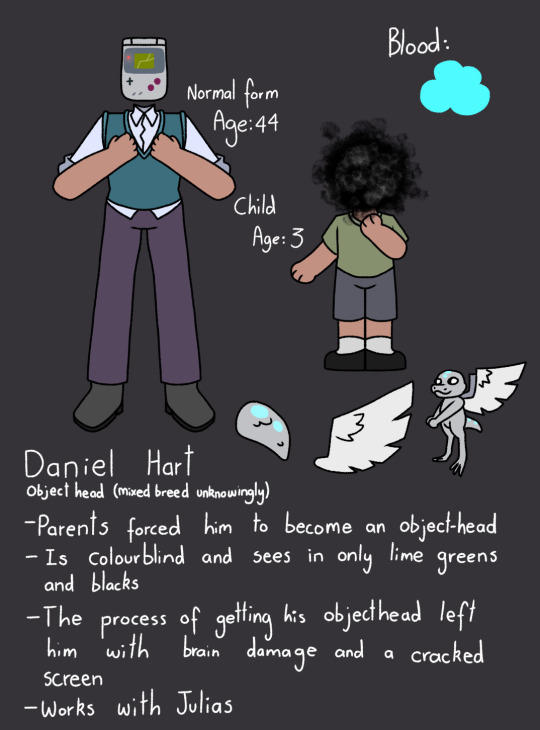
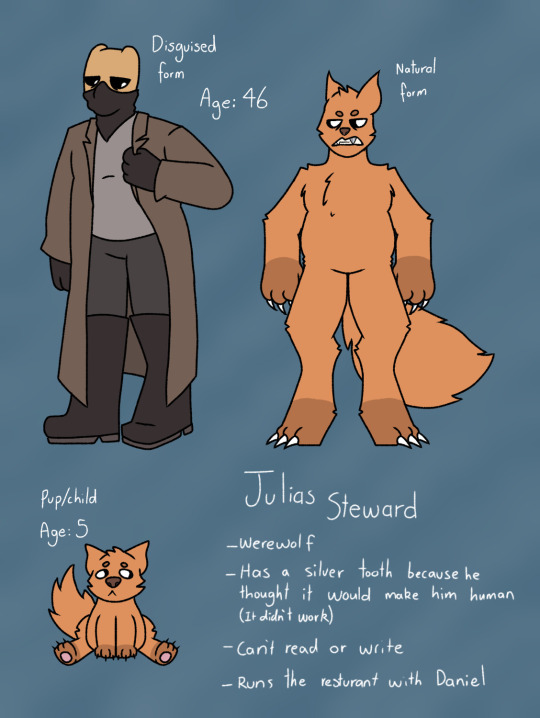
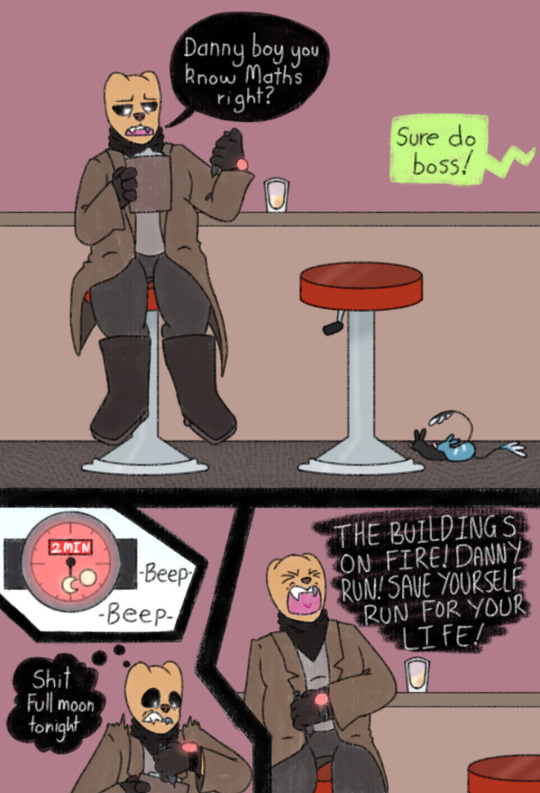
Moon Base Freddy's au
Can't say a lot on this one's reason for existing other then it was heavily inspired by the song The Fine Print by Stupendium. I drew a few artworks for it in some privated live streams. Basically the whole au was a space capitalist dystopia in which all the employees were owned by the company, oh yeah also the restaurant was a moon base that they lived in. Canceled due to not really having anything to do with Freddys, it just sorta had a Freddys mask on. Also lack of motivation which tends to kill a lot of my ideas.
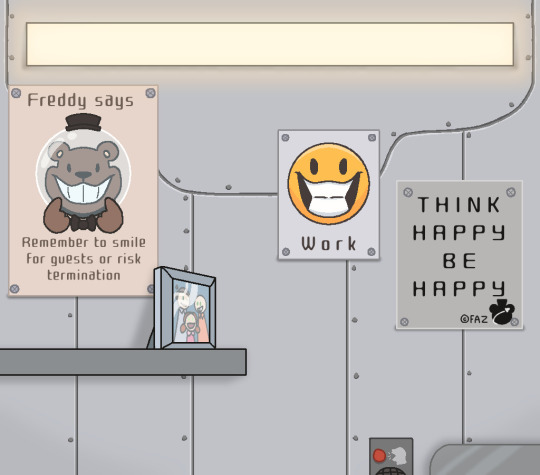
Floral Flurry
Not much to say on this one either, didn't have much to it either. Was another attempt at making a non fandom project that died very quickly. Had help from @/systemfailuretpd for the designs. The storyline was pretty basic being about a parasite plant that learns empathy from its new host and has to go back and fix what it did with its past host. Canceled due to just not really wanting to work on it, was kinda boring and felt too cutesy and simple despite one of the characters previously being basically a genocidal dictator.

Dr Surus' Experiments
Another oc story, this one was about a Dr Frankienstien type who would bring people (several of my oc's) back to life as basically zombies for fame. The story was mainly about David, Jannette, Stevm and another oc that I can't remember rn. Their whole deal was going to be talking about the ethics of bringing someone back to life and how they can't give consent. It was planned to be my next big thing that I was gonna reveal in the animation I'm still working on. Honestly given my track record I would not have been able to convey the messaging very well. Canceled due to lack of interest and generally loosing motivation to work on it.
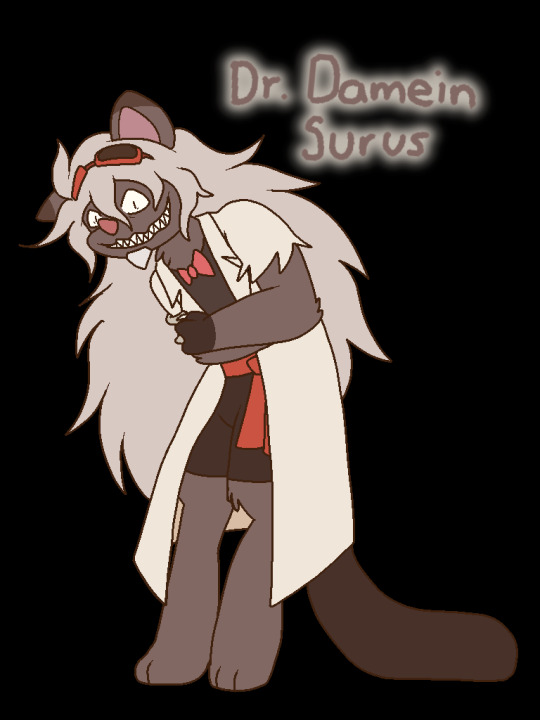
Pet Shoppe Cats
Another oc story comic that was meant to be a non fandom project. It stared two main characters named Felix and Chip, Chip was an immortal parental figure to Felix. Both were half self inserts and sorta didn't do much. They worked at a pet shop together as they were both animal hybrids which was mostly a trans allegory but despite that I didn't really focus on that with the story being a slice of life thing about them just working at the pet store with not much else happening. I made a few panels and character sheets but not much. Canceled for pretty obvious reasons, was boring and lacked focus. Art style was also just not fitting to my style and i was just sorta forcing myself to not draw something cutesy which my style cannot break from without lookin really odd. Basically I was trying to make myself do something I can't do.
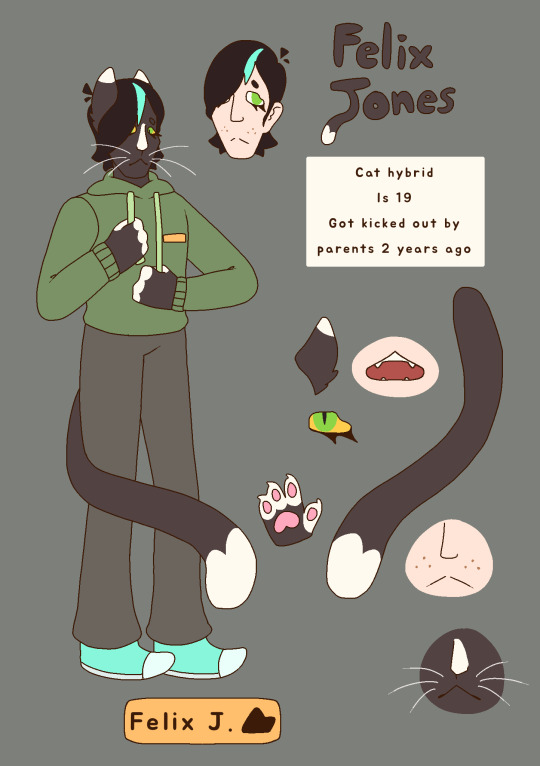
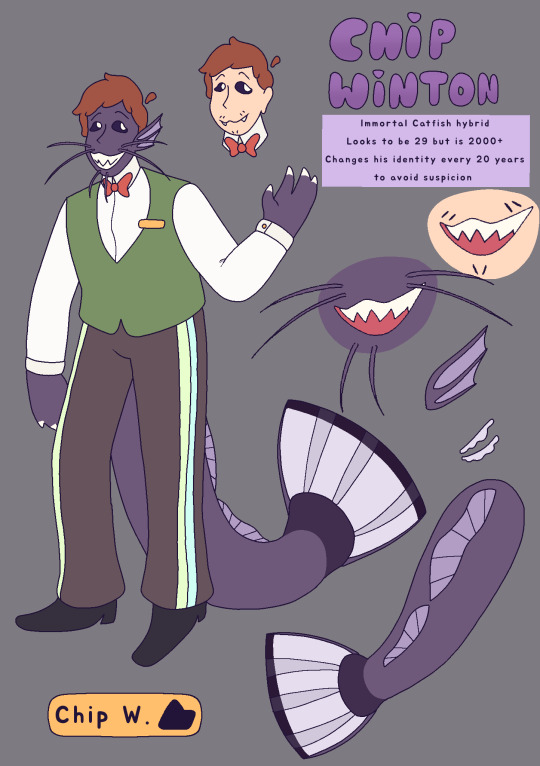
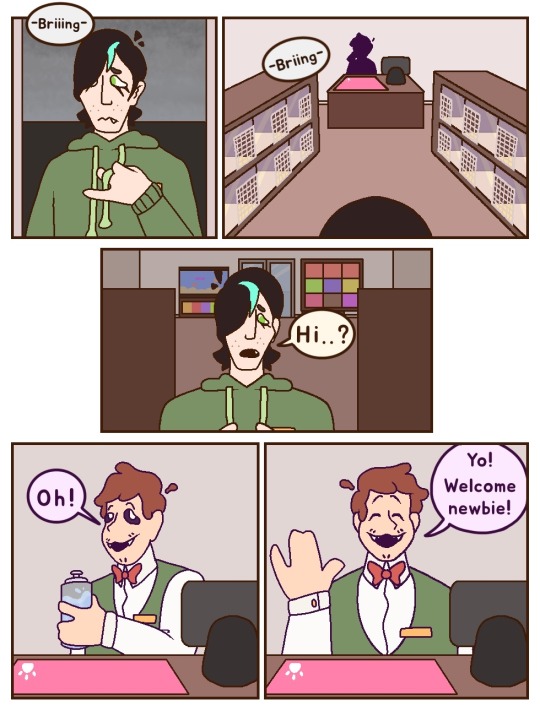
Aaaaaand that is the end of Part 2 my fellows!
A lil shorter then the first one due to me removing a few as upon looking at them again they would be rift content.
The final part will be the unfinished ones on the verge of being canceled so their fate is very up in the air.
#dsaf au#dsaf moon base#felix and chip#floral flurry#dsaf oc#dsaf david#dsaf stevm#dsaf jannette#dsaf jack#dsaf dave#freddys moon base#freddys in space ref#art#art tag#digital art tag#digital art#artwork#artwork tag#digital artwork#digital artwork tag#artist on tumblr#artists on tumblr#dsaf#dsaf steven#part 2#mod cd
8 notes
·
View notes
Note
Okay, so the next time Marvel retools its continuity, Steve Rogers has to be né Stephen Rothkowitz, son of Russian Jewish immigrants on the LES, right?
That's a very interesting question!
The first thing I'd note is that Marvel doesn't really retool its continuity per se, that's more of a D.C thing. Indeed, Marvel kind of takes pride in the fact that the main continuity of the 616 has never been formally rebooted, that while the plates may have wobbled from time to time they've managed to keep them spinning since 1961.
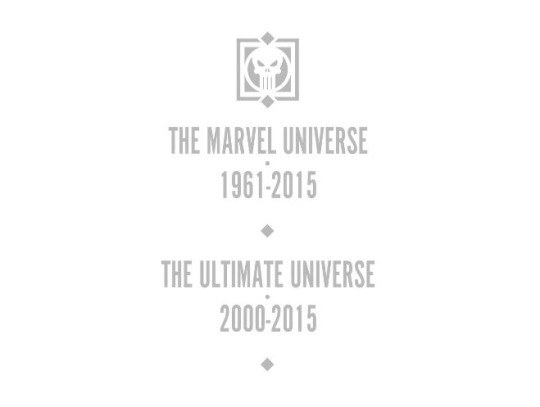
Leaving aside that bit of pedantry, I think the question of whether or not to have Steve Rogers be retconned as Jewish is a very interesting one - and I think it ultimately comes down to what kind of message or theme one is trying to convey through comics. When Siegel and Shuster decided to bolt a Moses allegory onto their reclamation of the Nietzschean Ubermensch, that was a statement to the Nazis of the world: the ubermensch was a Jew.

As I've said before, Jack Kirby and Joe Simon were on to something a bit more complex than Superman when it came to Steve Rogers. To quote myself:
In a deliberate thumb in the eye to Hitler’s racial science, Steve Rogers is turned from a malnourished working-class intellectual into the very image of the Aryan Superman Hitler fetishized by a Jewish refugee scientist – alternately named Joseph Reinstein or Abraham Erskine – who is then gunned down by a Nazi agent.[3]
Pre-serum Steve Rogers stands in for many things that Hitler hated and wanted to purge from society - he's the "degenerate" "cosmopolitan" artist/intellectual, he's physically disabled and absolutely would be labeled as "undesirable" under the "Law for the Prevention of Hereditarily Diseased Offspring," he's a working-class premature anti-fascist (i.e, he's a "red"), he's a second-generation immigrant from the Lower East Side - so the question naturally arises, is he also a Jew?
I think it's a bit complicated. Certainly, as I've written about before, subtextual Judaism is all over Steve Rogers' origin story. In addition to the immigrant LES backstory, there's also the fact that Rogers' transformation into Captain America is absolutely depicted as the work of Jewish emigre science. To quote myself again:
So in 1941, when Jack Kirby and Joe Simon introduced us to Captain America and the name of the scientist who gave him his powers was Professor Reinstein at a time when the most famous Jewish emigre scientist in the world was Albert Einstein, the subtext was clear: Captain America’s serum is the result of Jewish emigre science, here to save us from the threat of Nazism. And while it’s changed somewhat in the last 60-70 years, the fact that the 2011 film has Doctor Abraham Erskine be both a scientist and a quasi-rabbinical figure, the subtext is still there.
I think there's something very deliberate in Kirby and Simon's choice to have Steve Rogers be transformed into a blond-haired, blue-eyed ubermensch, the very ideal of Nazi eugenics but one absolutely dedicated to a political ideology that's anathema to Nazism. In that context, it might be argued that having Steve Rogers be Catholic rather than Jewish might be a useful part of the analogy rather than just subtextual cover - he's the Popular Front cross-ethnic coalition, he's the example of righteousness among the goyim to inspire other goyim to take up the cause of anti-Nazism.
There's also a reading of the text that both points to the subtextual Judaism of Rogers' origin but also why Rogers is in Judaism but not of it - the rather common reading that Captain America is a golem. As I've said, Reinstein/Erskine is a quasi-Rabbinical figure, endowed both with higher learning (the super-science formula that is lost with his murder so that there is only one Captain America) and moral authority, who creates an incorruptible force for good to defend America and its Jewish commuunity from the evils of Nazism.
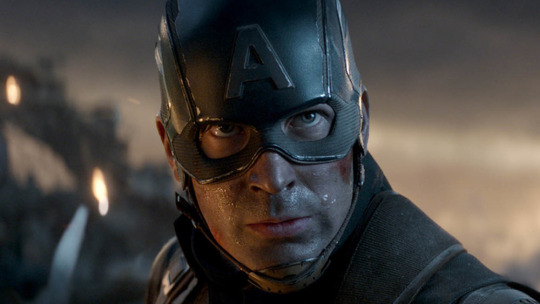
As Captain America, Rogers bears a letter A on his forehead that is analogous to the Hebrew letter א that plays a crucial role in the tale of the golem. At the same time, not everyone agrees with this reading, so it shouldn't be taken as a given.
After all, Steve Rogers could also be argued to be Marvel's answer to the atomic bomb, a force of superhuman might capable of winning world wars - but one endowed with a moral intelligence and free will that the bomb lacked. (Incidentally, I was absolutely gagged that some Gen Z folks think that the Manhattan Project was something made up for the MCU, because it was mentioned in passing that Howard Stark worked on it. I can't wait till the kids find out about the Black Womb Project...)
Conclusion
At the end of the day, I don't know whether I would prefer Steve Rothkowitz to Steve Rogers - there is something indefinably different between the idea of Jewish resistance to a genocidal ideology directed specifically against them and the idea of a goyish neighbor, someone who grew up in the neighborhood and learned some Yiddish along the way but who wasn't exactly au courant with Rabbi Hillel, taking up arms in the cause because they've reasoned it's the only morally acceptable thing to do.
68 notes
·
View notes
Note
Hiiii!!!! Can I please request a headcanon home brew with the reader being friends with rocky? It can be angsty or fluffy or whatever you prefer! Thank you 😁
Took a more lighthearted direction with this, to offset a particularly angsty romantic oneshot that’s eventually to come… One must maintain a balanced diet of their illicit beverages and all. It also ended up a bit specific. Hope you enjoy!
So you’ve become friends with the notorious poet, eh? Congratulations! There likely wasn’t much effort needed on your part.
He’s naturally talkative (and how) as well as sociable (though lacking the skill), but you had to have bumped into him several times in the same setting before a true habit was formed of it.
Being a regular at the café or the speakeasy is the setup that most easily lends itself… maybe one before the other, though he wouldn’t bring you downstairs unless you were explicitly interested. The criminal scene might not be everyone’s cup of tea, after all.
You’re less probable to find out about the Lackadaisy from him, either; it’s likely Ivy told you first, seeing how much you two get along as well as finding you genuinely personable and interesting. But if you end up undeterred by the revelation that he works for a bootlegging operation and would like to take that trip downstairs some night, he’ll be glad to have you see him play with the band!
Speaking of, if you were also an artist, he’d be elated.
The stanzas shall flow like water from an overly tenacious tap regardless of your expertise, of course. Uneducated listening ears are better than none, and he’ll appreciate even surface level analysis and positive feedback if you bother with such. Don’t fret if you don’t understand all of the words or get tangled up in an abundant array of alliterative allegories. You’ll learn to adjust accordingly. (Or so he assures.)
But! If you’re a kindred creative soul, it’s a common ground he’ll hop onto with utmost eagerness.
A fellow poet or writer? He’d hinge on your every word of appraisal. How did you like the flow of this one, (Y/N)? You could practically feel the expressionistic scenery enveloping you with this picturesque wording, could you not? What about that one metaphor about the stars, (Y/N)? Surely it conveyed his message on the sweet transience of life? (Y/N)? Oh, (Y/N)! Please answer him, (Y/N), he’s begging to know.
Don’t worry, it’s not one-sided. He’s always all up in your literary business and half-finished drafts in return, asking plenty of questions and insisting on being your first audience for everything. He’ll listen to you talk yourself out of plot holes and come in handy as a sentient thesaurus whenever you get stuck on the synonyms.
(Though I cannot guarantee he’s capable of providing a distraction-free environment. Any environment truly free of distractions is one where he is absent.)
A musician? Oh boy! Your instruments may not be the slightest bit compatible, but that could never stop him from making the most splendorous harmonies together with his dearest chum!
Teaching each other songs you know is a must. Beloved classics like Vivaldi as well as local tunes from either of your lands of origin; he’s an extremely quick learner, as you’ve found out, with a keen ear and significant thirst for knowledge, especially when it comes to things dear to your heart.
You’ve observed how deeply serene he appears to be when playing a certain song or two with a gentle folk-like ring, as if in a trance of reminiscence. He claims not to understand what you mean when you bring it up… so you play along in silent understanding, earning a smile back when your eyes meet that is, for a change, admittedly softer.
Or perhaps a visual artist? Painter? Comic strip illustrator? Cartoon animator?
He would so brag about having an animator friend (even if only aspiring). To the surprise of no one, he’s a great fan of those whimsical hand-drawn moving pictures. Some may find them silly, but in his vocabulary that’s a staple of high precedence.
Yes, he has been to the movies several times, and a shared interest would provide a stellar excuse to accompany you there. Unfortunately, he both refuses to let you treat and is perpetually penniless, so he has the two of you sneak in by less than rule-abiding means. You’ve gotten thrown out before. (Likely not the first time when going out somewhere with him, and neither is it the last.)
But let’s suppose you’re a painter instead. Likely you’re creating in the chiefly popular styles of the era; impressionism, surrealism, the like. Even if not, he still praises you for sticking to your individuality. If you’re a misunderstood artist like him, he reassures with genuine conviction that you’ll make it into the galleries someday, current trends be damned. (Maybe you both are simply ahead of your time.)
The contents or perceived quality are entirely negligible, because he will find a way to compliment your work. Usually his criticism is focused less around your technical skill and more so his emotions and ideas sparked by the sight that are occasionally heavily abstract or several degrees of detached from your original intent. Still, the different perspective can be… well, interesting to hear out, at least.
When you’re coloring or shading certain parts in certain ways, like circularly or with a soothing curve of the brush, he’ll trail off in whatever he was doing or prattling on about and watch quietly for a bit as you work. It’s only embarrassing when he was in the middle of telling you something; he might even lose that line of thought. (Far from the only time that ever happens to him, so you’re forgiving by now.)
Listen, stimboards didn’t exist in the 1920s. He’ll take what he can get.
As for him, well, his personality isn’t the only thing that stopped substantially developing at the age of twelve. His visual art skills might begin and end at silly-looking scribbles caricaturing himself and the people he knows, but he’s satisfied nonetheless. Ambitious rhymes and ornate metaphors are more his department.
He’s still gotten a chuckle or two out of you with his humorously misshapen efforts at drawing you, so he considers that a win as well.
I’ve mentioned lands of origin. If you’re from a state he’s yet to have visited, he’ll surely ask a number of questions about your experiences living there. But if you’re from overseas? Another continent? Nation he’s scarcely heard of? Square that number and multiply by ten thousand.
It’s exciting to hear about different cultures, alright? He likes to understand you better. In any case you make an easier job of it for him than the other way around.
He’d likely have a lot of respect for you for learning English so well, even more so if mostly by yourself. (Viktor’s intimidating disposition and inclination to punch him at the slightest provocation are not the only reasons he never corrects his phrasing.) If he’d said some difficult or rare word you don’t understand, he wouldn’t have to hesitantly accept your complaints of confusion as exasperated mockery for a change and instead could take the time to kindly explain. Probably in an even more troublesome way. You go through like five overcomplicated synonyms before one of them finally rings a bell… but he’s patient.
Expect spontaneous “hey, how’d you say that in your language?” inquiries in the middle of a conversation, out of sheer curiosity. You may only laugh at his clumsy mimicking of your pronounciation once, because he adapts to the unique sounds of a foreign tongue scarily fast. He greets you with the everyday words you’re rather used to hearing around your hometown thousands of miles away and it’s downright uncanny how natural it sounds. (Which is why you’ve asked him not to do it without warning.)
You can’t quite hold conversations like that yet, but you reckon it’d be fun to annoy everyone else around you with if you ever got him to that point.
The others at the speakeasy are mostly baffled by the fact you’re willingly sticking around, especially if you’re not a colleague, for Rocky’s company. Not many people can, well, tolerate him. He’s honestly a bit much sometimes.
But you liked him when you were running from the cops together in scant apparel covered head to toe in dirt as the flames digesting some poor sod’s patio crackled distantly and you wondered how a starry night walk by the riverside had so inexplicably devolved into acts of incidental vandalism, and you continue to like him nowadays.
He’s your friend, after all. The adventures born of questionable choices are part of the deal. And like his soft-spokenly reluctant cousin (except less so motivated by guilt) you’re there with him through it all to make sure he doesn’t get himself in serious trouble… much.
#{💌 mod rory 💌}#headcanon home brew#lackadaisy#lackadaisy & reader#lackadaisy reader insert#reader insert#lackadaisy rocky#rocky lackadaisy#rocky rickaby#rocky rickaby & reader
126 notes
·
View notes
Photo
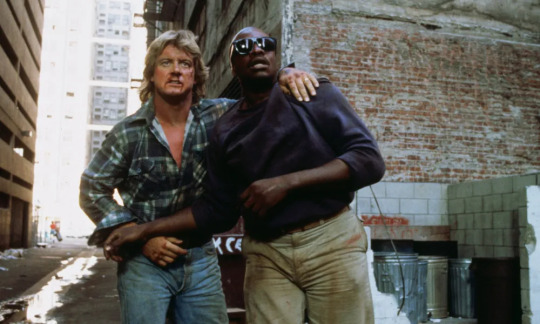
So yesterday was my birthday and I invited a friend over to watch some movies we’d been each putting off. He showed me They Live, which I’d somehow never seen, for the first time, and I repaid the favor by breaking his brain with Speed Racer and letting him see how everyone ever was 100% wrong about that movie at release and it is in fact the best thing ever, but in regards to They Live:
I expected a good time and had a really great one. I knew about it’s central alien allegory, and how it’s been co-opted by anti-semitic memes and right-wingers who think they’re being cute. I knew it inspired dialogue in Duke Nukem, I knew it was a John Carpenter film starring Roddy Piper with Keith David in it, and that was it. I was blissfully unaware of everything else, including the fact that it somehow winds up being a spiritual successor of “The Challenge of the Beyond”, the pulp writer round robin exercise nowadays most famous for it’s H.P Lovecraft - Robert E.Howard parts.
There’s a post on it that floats around regularly and I’ll link here for better explanation, but in short: Lovecraft’s section of this story had the protagonist George faint from terror constantly and go mad after turning into a giant alien centipede, which was followed by Robert E.Howard immediately retconning said madness in his opening line and having the character embrace his new life as a horrid centipede beast in a new planet and go on a conquering rampage of “titanic adventure” as George the Centipede Barbarian. I bring up George the Centipede Barbarian not because it’s funny, but because They Live intentionally pulled off a very similar kind of brutal tonal dissonance.
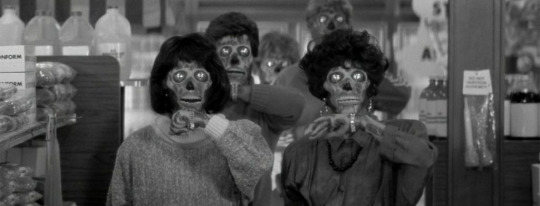
They Live is very comparable to The Thing in the sense that it is a 50s concept told through 80s filmmaking and distorted accordingly, to the extent that the black and white parts are not just colored differently, but shot differently from the rest of the film in a way that’s far more reminiscent of 50s horror films. Our protagonist is an 80s meathead cowboy who lives in a struggling urban landscape with mysteries and horrors he never quite understood but continue to plague him and those around him, and he has a moment of truth when he puts on magical sunglasses and finds out that he’s been living in a Twilight Zone episode the whole time, and so has everyone. The black and white allegorical terrors won and have been running everything all along, and that is the point the episode should end with our protagonist horrified and broken, “wouldn’t that be fucked up / doesn’t this remind you of something / these horrors are real” message conveyed, episode over.
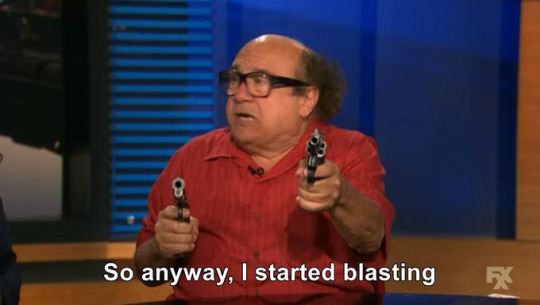
Except our protagonist is an 80s meathead cowboy, so instead of surrendering to the horrors after finding out everything is a monstrous lie, he fights back with a shotgun and a bag of one-liners. Dude just immediately, like not even 10 minutes after he first puts on the glasses, starts blasting alien cops and bankers and spaceships. I really did not think that “bubblegum” one-liner happened that early in the movie. This dissonance would have been wonderful regardless but it helps that it’s done so intentionally.
I really didn’t expect that the movie was this 100% completely blatantly unsubtle about the true nature of the alien ghouls as bloodsucking capitalists. It’s not some veiled allegory that can be left to interpretation, the movie tells you repeteadly and explicitly what it is about. The film tells you that the aliens are weaponizing communist paranoia to gain control over cops, preceding a line “We'll do anything to be rich” and then a description of them as “They are free enterprisers. Earth is just another developing planet, their third world” is actual dialogue from the film and that’s just before we learn the aliens all wear expensive watches, that most of the cops going around brutally gunning down the resistance are humans who sold out, and get scenes of the aliens and humans standing around in suits congratulating each other on profit margins. I don’t meant this as an insult but it’s frankly cartoonish in how unsubtle it is, it’s insulting that John Carpenter even had to set the record straight with Yes This Was About Capitalism and Reagan and Yuppie Bloodsuckers You Stupid Fucks like the movie isn’t hammering the point constantly.

If you haven’t watched it, did anyone ever tell you that the inciting incident of the movie is the protagonist being radicalized by police brutality? Yeah, funny, nobody ever talks about what happens in the movie before George puts on the sunglasses. The first 20 or so minutes are about the protagonist, George Nada, arriving in the city and struggling to find a job or place to stay and being offered one by Keith David’s character Frank, who takes him to a homeless community. They have a handful of dialogues together where Frank repeteadly expresses a cynical viewpoint towards life under You-Know-What, over opportunities turning into traps and steel mills giving themselves raises by screwing workers over, and George brushes him off stating he still believes in America, he still believes in getting a fair shot.
George is quickly and immediately reduced to horrified bystander as the police storms his community and destroys their church and goes around beating up them up and evicting tents by bulldozer, while George runs around trying to help and save at least one of them. The next time we see him, he puts on the sunglasses and learns the awful truth and starts his rampage (framed in no uncertain terms as an act of revolution) by doing, what else, shooting cops. Or, well, aliens who approach him as cops and tell him that, now that he sees them, they can work out a deal to profit together if he just goes quietly. The movie makes it as obvious as it could possibly make it.
So yeah, watch They Live, it’s Duke Nukem vs The Twilight Zone’s Episode on Capitalism (with Extended “Guys Being Dudes” Action, I’m glad I didn’t know about that alleyway fight scene beforehand). Also watch Speed Racer, it’s glorious, and it has the exact same villains. Had a really great time yesterday with both.

#they live#film#John Carpenter#roddy piper#keith david#everyone who told me this movie was ambiguous was full of shit#I do wish it was a little more clearly against Othering since that might have prevented it's unfortunate legacy#but you can't blame Carpenter for underestimating how deeply stupid anti-semitists are#it's mostly sad but still funny that american right wingers keep using this movie for their memes#my dudes this movie couldn't possibly be more about you#yes it draws a line between aliens and sellout humans and yes it's more specifically about#unrestrained Reagan capitalism#but come on#the aliens are red white and blue ghouls who treat the world the way America treats the rest of the world#the movie is pointing at you and saying you ruined everything and you deserve to be shot#Avatar wishes it could be this potent as a criticism
195 notes
·
View notes